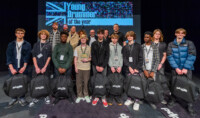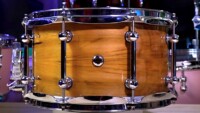From West End, to the pop world, and back to musical theatre…
Ed Carlile
– Waitress – Dreamgirls – Viva Forever – Jersey Boys – Desperately Seeking Susan – Little Shop of Horrors –
 Having played the drums from a young age Ed Carlile didn’t really consider making music his career and despite playing in various bands throughout his teenage years he chose to go to the university of Bristol to study for a History degree.
Having played the drums from a young age Ed Carlile didn’t really consider making music his career and despite playing in various bands throughout his teenage years he chose to go to the university of Bristol to study for a History degree.
“During university I played more football than drums” – but when he didn’t know what to do after the course, he decided to look into pursuing music. He joined the ACM in Guildford for a 1 year course and soon started depping for his tutors on various gigs. It then was tutor, Mike Sturgis, who put him forward for his first taste of musical theatre: a 3 month run of ‘Tick, tick… Boom!’ at the Chocolate Factory in Southwark. While initial doubts about his own sight reading abilities almost had him decline the gig, it turned out to be this show that opened him the doors to London’s West End.
Following an invitation by the shows MD, ‘Mama Mia’ principal drummer (and member of Cutting Crew) Frosty Beedle came to see the show and immediately took a shine to Ed’s playing. So much so that only a few weeks later he asked him to dept on Mama Mia and thereby offered Ed his West End debut at only 21 years of age.
“I didn’t really know what I was getting myself into”, Carlile explains, “and was probably too young to really be nervous about it”. The nervousness would have been unfounded as soon after dept jobs on various shows started flooding in, shortly followed by his first “own chair” on ‘Little Shop of Horrors’.
After pursuing a successful West End career for a few years it seemed time for a change and Carlile withdrew from the musical theatre world in his mid 20’s. Wanting to broaden his horizons he started doing various gigs around town and consequently was put forward to play for British Pop artist Mika. “It was great. It’s just a totally different world. In the West End everything is very much under the microscope, precise and even clinical in a way, whereas Mika just wanted it to feel like a rock’n’roll band”.
After having lived the pop touring life for about five years, an offer to be the principal drummer on Dreamgirls brought Ed back into the West End. Settling down with his wife and kids, the safety of a gig like that came at the right time. “The West End thing is incredible for a bit of stability: you’re able to work, play with some great musicians and you’re able to build a life around that”.
Since then Ed has played drums on countless shows and has become a solid member of the theatre scene.
Off the drum chair Carlile works in his studio in West London recording, writing and producing pop music with a variety of artists.
 How did you start getting work in the West End?
How did you start getting work in the West End?
For me it all started when Frosty, the drummer of Mama Mia saw me play. I think that’s the key. A lot of the young guys who come to sit in ask me how you get started and I think really the best way is for someone to see you play. That’s hard though because you can’t really expect guys to come to your gigs; so most likely is probably that they just begin to hear ‘so-and-so sounds good’. The only way that happens is firstly you do sound good; and secondly you play a lot and people talk about you. I was fortunate that this guy Frosty saw me, heard something that he thought would work on his show and just took a punt. It is hard though because it’s very unlikely for example that I would book a dep that I had never heard play and nobody else in the band knew. It can happen but everyone is gonna get a bit nervous about that and unless they want to arrange a rehearsal (which never happens), nobody will ever go for that.
So the key thing for young guys is to play as much as possible and get your name around in the circle of people that you’re operating in at that point. Those people you play with when you’re starting out will be the guys that you will work with later on; and they will give you work.
What are the main challenges of playing in musical theatre?
The challenges are in many ways the same as on every gig: to do it well you have to really understand the music you’re playing. One of the bugbears that I have with musical theatre is that now especially there are a lot of pop shows; and then you have old-school shows like Mary Poppins. They are entirely different shows. Don’t expect the same drummer to be great at both because that hardly ever happens. To play pop music properly you have to get the right people who really understand how to play pop music, and know the key reference points – and shows are rightly getting more picky like that now. Same with a Big Band show for example. Just because you get somebody in who’s done ‘a’ show doesn’t mean he would be good playing a Big Band show.
So I think the challenge is you have to not approach it like a show but just like any gig you work; which is: how do I get the sound right; what is the required sound of the drums; what is the feel of the show; what’s the music like; what do the writers have in mind and what does the show require? In the same sense that when an artist approaches you for a gig you’d want to hear their music and understand where they’re coming from, learn their back catalogue etc
Another challenge is playing eight shows a week. That can be tough – even physically. Dreamgirls for example was a big play and I had to tape up my hands every show.
The biggest thing that I see people either succeed or not do so well is whether they really understand the music and what the MD, musical supervisor and other people behind the show, envision. I think sometimes drummers in particular can struggle with that. They bring so much character to any project the play on, it’s such an enormous sound and big part of any piece of music that if the drummer plays something stylistically at odds of what the music should be, the whole thing just sounds crap.
Understanding the music, and playing with a good feel is definitely the biggest challenge.
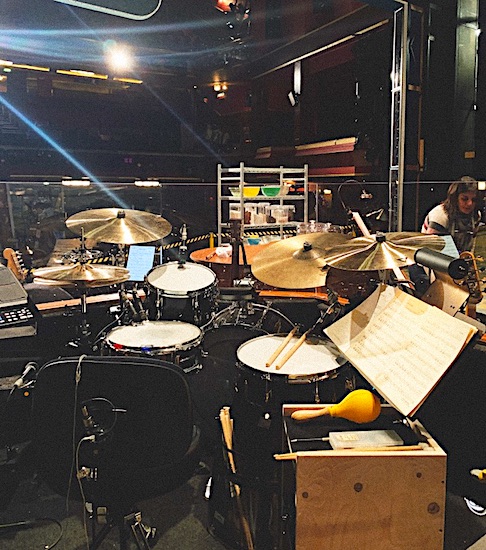 You’ve just made this point yourself already: You play eight shows a week. How do you keep it fresh and interesting for yourself?
You’ve just made this point yourself already: You play eight shows a week. How do you keep it fresh and interesting for yourself?
On Waitress, the show I’m doing currently, there are a few bits in the show where it’s kind of very open what you do and I made a point that I would never ever play the same thing again in those sections. Sometimes it’s a matter of “Oh that could have been better” and sometimes I think “Yeah, I actually quite liked this one” – but I’m always just gonna sit down and see what happens at that point.
The other half is just discipline. The discipline to not stray from the parameters of the music just because you could play something a bit flashy – which I’m not really good at by the way. “Just because you could” is a terrible reason to do it. That shows a real lack of respect to the music and the people around you and you can really steer a show in the wrong direction if you start overplaying. On the contrary you can keep a show really tight, in the pocket and happening and give great energy to the performers and singers – and that’s the job. Yes you want to be alive in it and find some areas to express your character but the job is about discipline and keeping the show on track.
What’s the hardest show you’ve ever played – and why?
Anything can be hard if you feel like you’re not gelling as a band. If for whatever reason the make up of the band that night doesn’t quite work, in your head you just switch off. It might be the bass player who isn’t quite doing what you want, the singers are sounding awful or anything else that annoys you, that makes things quite hard. I think most shows don’t have incredibly challenging bits to play. Maybe I’m just always doing the easy shows, I don’t know. I actually think the show I’m currently doing is probably the most simple show I’ve ever played in terms of what the music is doing. It’s incredibly straight forward pop music but to play it really well is very challenging.
Now that we’ve done it a lot it’s quite set and there is a lot of muscle memory involved in terms of what we’re all doing as a band but setting it up I remember thinking about a few things: there is no percussion, no loops, no backing tracks and we’re quite a small band. Lots of shows have all of those elements and your life as a drummer is a bit easier because the groove is not just on you and the rhythm section. This show is much more about playing in a more organic way and although the parts are simple, it’s actually quite hard to get it sounding really good and feel right.
So yes, I do think anything can be incredibly hard. Equally, anything can be made to feel easy if you’re surrounded by some really good players.
The challenges may be different to technical challenges but it’s about execution.
 What’s your advice for players who want to prepare themselves for working in musical theatre?
What’s your advice for players who want to prepare themselves for working in musical theatre?
My advice would be definitely don’t limit your experience to musical theatre. I don’t even know what musical theatre is now. Going back 20/30 years that was a particular thing (with show tunes I guess) but I don’t think I’ve ever done a show like that. All the shows I’ve done are pop shows and it seems lots of shows now are based to some extent around modern music. In terms of preparing yourself, you need to sound like you can play modern music and understand what that really is. That also means understanding what drum sound the show requires and understanding elements of electronics because more and more shows have that going on.
There are skills that are unique to musical theatre like following a conductor, playing dynamically, understanding what the show requires and that the music is part of a much bigger thing. The music is only one element of the show and is just as important as, say, lighting and automation. Understanding that is certainly useful.
Ultimately though the thing that makes you a person that people want to play with is: do they sound good playing that music and are they reliable playing that music.
There are nuances in what a show is and how it works – for example what it’s like to work with a MD – but those are little things that you can learn very quickly. The thing you can’t learn quickly is being a drummer and musician that people really like. That’s not unique to musical theatre though, that’s the rule everywhere. The only way I’ve got any gig I’ve got is because someone liked the way I sound.
One practical thing to prepare yourself though is to go and sit in with people. Most guys are open to that if the show allows it and it’s an amazing thing to be able to do that. What other job can you actually go in and spend a day with the guy who does it? As a drummer you can do that to any of the guys playing these shows. Maybe you’ll end up thinking it’s not for you but you might learn some stuff and get an experience of that world. That’s definitely a great way of seeing what you think of it.
Another thing I get asked about a lot is reading music. There seems to be quite a divide amongst the young guys: either they feel confident or they don’t. Very few people go “I’m kind of ok”. Yes you do need to be able to read for sure but what I want to say as an encouragement to people who don’t feel super confident sight reading is that when you’re depping, you’re not sight reading, you’ll have been giving the parts to learn. You need to understand how a chart works, otherwise you’d struggle, but by the time you come to play the show most people who have put in the work would use the chart more as a cheat-sheet. It’s just there to help them understand the structure of the song. Reading is really just a faster way of learning a song. If you’re a slow reader you’ll have to do more work to learn the song and maybe in doing so you’ll actually sound better than someone who is a fast reader and puts in less prep work. What I’m saying is that you shouldn’t rule yourself out of it just because you’re not mega confident reading.
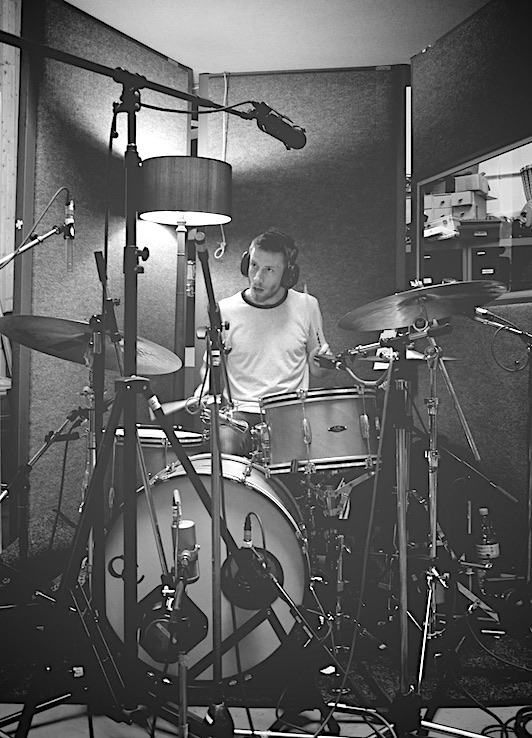 How important is it to have a solid knowledge beyond ‘just’ the drum set? For example percussion, tuned percussion or electronics.
How important is it to have a solid knowledge beyond ‘just’ the drum set? For example percussion, tuned percussion or electronics.
I don’t really play percussion beyond being just a drummer blagging it on a shaker. I sometimes feel for the guys who can do percussion and get known for it because they often get overlooked when it comes to ‘just’ drum gigs. You need to be careful how you bracket yourself. If you start doing drums and percussion gigs those are the gigs people will look to you for – even if you sound killing on drums they might just get a drummer for a ‘straight’ drum gig. So, I wouldn’t force yourself into an area you’re not comfortable with but if you can play percussion and drums, there are loads of shows that require that.
My experience with electronics is fairly limited but I guess most of that stuff is quite straight forward. For me that comes much more from the work I do in the studio rather than live work. On shows someone will set that stuff up for you but you will be in the conversation so it’s probably helpful to have a bit of an understanding of what’s going on and you’re not just mindlessly hitting pads. But again, It’s not essential at all I would say.
How does being on stage compare to being in a pit?
There are plus and minuses.
I like being on stage because you’re more involved in the show, you get to know the cast a bit more and you get to see a few more people in your working day. That’s quite nice. If you’re in the pit you could sometimes walk into the building, go straight to your drum booth, do the show and then walk straight out and you only spoke to stage door! When you’re on stage there is just a bit more interaction going on.
The negative I guess is that you can’t switch off and just read a book (well you can’t get caught doing that anyway). Those nights when you’re knackered and you’re just sort of there, in the pit you can lean back and relax between songs. On stage you’ve got to try to appear a lot more engaged.
So both have their pros and cons.
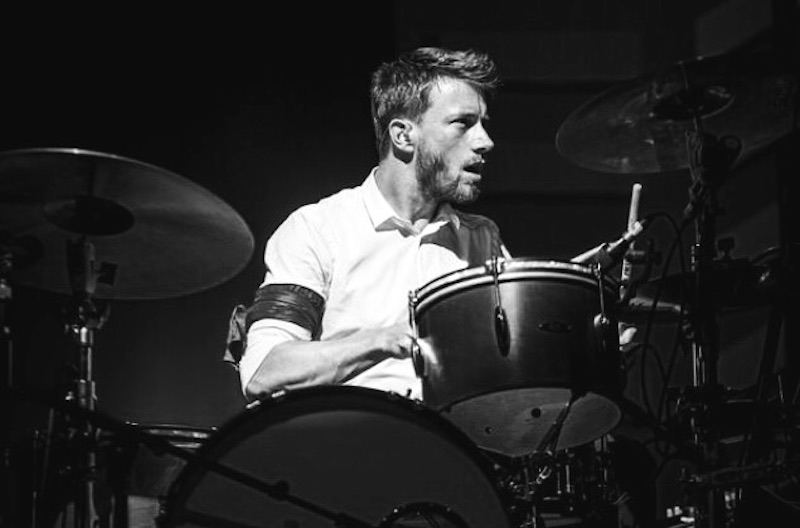 How has technology changed working in the West End?
How has technology changed working in the West End?
I think technology has changed because the shows that are coming in have changed stylistically. I don’t know the numbers but I would say half of the shows are pop shows now. Our show is written by Sara Bareilles, Max Martin wrote “& Juliet”, “Mama Mia” of course, is a pop show – just to name a few. As a result of that the technology changes because of the sounds you need to deliver to do those shows. It’s the style of show that changed and with that come all sorts of other changes. Probably even things like automation where things on stage are moving around. It’s all trying to look more like a pop show rather than the old school theatre with a band in the pit. They put in a lot of thought on how to deliver a modern pop sound: well, you need some 808’s and some subs in the P.A. to start with!
From a musical point of view everyone still wants the same old things: drummers with a great feel and a very good sound. That’s always been the case and I can’t see the changing.
So in some ways there are new challenging to playing music whatever your gig is (whether it might be a West End thing or a pop gig) but it’s always the old stuff that rings true: does he who sound good and is it someone I’m looking forward to go into work to play with.
Thanks a lot for your time Ed!
Interview by Tobias Miorin
November 2019




